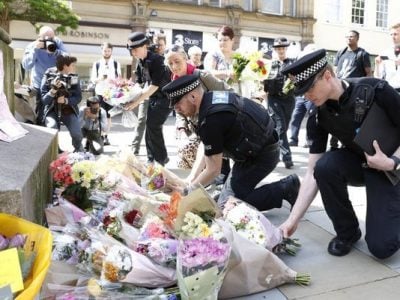Official Account of Manchester Suicide Bombing Unravels

It took less than 24 hours for Prime Minister Theresa May’s claim that Manchester suicide bomber Salman Ramadan Abedi was known to British intelligence only “up to a point” to be exposed as a lie.
Reports from acquaintances of Abedi and a series of leaks from US and French intelligence sources make clear that the security services knew that the 22-year-old who took the lives of 22 people at the Ariana Grande concert at the Manchester Arena Monday night was a serious threat to public safety.
British intelligence had been warned about Abedi being a possible suicide bomber as far back as five years ago. The BBC reported that two college friends of Abedi had made separate calls to the police at that time because they were worried that “he was supporting terrorism” and had expressed the view that “being a suicide bomber was OK.”
Among a plethora of leaks, NBC reporter Richard Engel tweeted that a US intelligence official told reporters that Abedi’s family had warned British security officials that he was “dangerous.”
Later that day his father and brother were arrested in Libya, accused of being long-time supporters of Al Qaeda and planning further atrocities.
France’s interior minister, Gerard Collomb, revealed that Abedi (image on the right) had “proven” links with Islamic State, and that both the British and French intelligence services had information that Abedi had been in Syria, from where he had only recently returned.
British Home Secretary Amber Rudd and May’s office have both denounced US intelligence and others for leaks they maintain will damage the “operational integrity” of the investigation into Abedi. Their real concern is that these revelations have undermined their efforts to portray anyone questioning the official account of the Manchester bombing as a “conspiracy theorist.”
Events now unfolding fit a well-established pattern. After an atrocity occurs, it soon emerges that the assailants were known to the security/intelligence agencies, which without fail and for reasons never explained allowed them to “slip through the net.” But claims of incompetence carry no weight. The only plausible explanation is that these individuals are protected by forces within the state.
From a political standpoint, the origin of these atrocities is clear. In every case the roots can be traced to the catastrophic wars launched since the dissolution of the Soviet Union in 1991 through to the present day—in the former Yugoslavia, Afghanistan, Iraq, Libya, Syria and beyond. The result is a political and social disaster in these countries that provides fertile soil for the proliferation of terrorist groups and individuals.
Crucially, those primed for murderous violence on the streets of Britain, France, the US and elsewhere are products of reactionary terror networks that are intimately involved in these imperialist wars for regime change.
Abedi’s trips to Libya and Syria and his links to Islamist terror forces follow a well-worn path of perpetrators of bombing atrocities being tied in with sectarian terrorist organisations financed, armed and utilised by the Western powers. He comes from an area of Manchester that exemplifies British imperialism’s cultivation of Islamist terror groups for service in its foreign operations.
Abedi is reported to have been a close associate of ISIS recruiter Raphael Hostey from Manchester, who was killed in a drone strike in Syria in 2016. For years, a group of members of the Libyan Islamic Fighting Group were active in the Whalley Range district of Manchester, close to Abedi’s home. They were allowed to recruit there in return for their role in opposing the Gaddafi regime. The local leader, Abd al-Baset Azzouz, was active until he left for Libya in 2014. He was said to be an expert in bomb making, with 200 to 300 militants under his control.
Just as sinister as the Manchester attack itself is the political use to which it is being put. On Tuesday, May raised the national terror threat to “critical,” its highest level. Amid official warnings that another assault is “imminent,” nearly 1,000 troops have been dispatched to the streets, mainly in London, to reinforce counterterrorism officers. These moves are in accordance with Operation Temperer, a covert plan drawn up by the Tory government in 2015, when May was home secretary.
The latest attack follows a pattern where terrorist outrages coincide with critical ballots—most recently last month’s fatal attack on a police officer in Paris by Karim Cheurfi. This was used to justify holding the first round of France’s presidential elections at gunpoint, amid a massive police and army presence on the streets and at polling places.
France provides a serious warning of what may unfold in Britain.
A state of emergency has been in force in France since 2015 following a series of terror attacks in Paris. It was extended only yesterday, supposedly in response to the Manchester bombing.
Last week, L’Obs magazine disclosed that top members of France’s Socialist Party government had prepared a coup d’état in the event of neo-fascist Marine Le Pen winning the May 7 presidential runoff. The aim was not to prevent a National Front presidency, but to crush left-wing dissent and install Le Pen in power in an enforced alliance with a Socialist Party-led government. In the event, such was the obsequiousness of the nominal representatives of the “left” such as Jean-Luc Mélenchon, who effectively threw his support behind the banker Emmanuel Macron, that a coup was considered unnecessary—at least for now.
Does anyone seriously believe that similar discussions are not taking place in ruling circles in Britain?
 May called the snap June 8 election in an attempt to pre-empt the democratic process by securing a parliamentary majority to ram through measures that have no real popular support—deepening the austerity offensive against the working class and pursuing a course of escalating war alongside the US against Syria, Iran and even Russia.
May called the snap June 8 election in an attempt to pre-empt the democratic process by securing a parliamentary majority to ram through measures that have no real popular support—deepening the austerity offensive against the working class and pursuing a course of escalating war alongside the US against Syria, Iran and even Russia.
Less than 48 hours ago, her plans appeared to be in ruins. So acute was the political backlash over May’s manifesto proposal to make pensioners sell their homes to pay for social care that even her slavish media supporters worried that she might lose the election to Labour.
Such is the hostility in ruling circles in both Britain and the US to the prospect of Corbyn becoming prime minister—due in particular to Corbyn’s stated opposition to nuclear weapons and criticisms of NATO—that in 2015 an unnamed senior British general warned that there would be a “mutiny” should he become prime minister.
Already May has utilised the Manchester suicide bombing to shift the election agenda back to the question of national security, as she struts around unchallenged and unquestioned—the de facto spokesperson for the police, the MI5, the MI6 and the military. But things might not end there.
The most recent historical precedent in the UK for a snap election was that called by Conservative Prime Minister Edward Heath in 1974. At a time of enormous political and social tensions internationally, including a militant miners’ strike in Britain, Heath called the election to decide “who runs the country?”
Heath lost, but remained in Downing Street for four days. It is now acknowledged that discussions were being held between senior military officers on a possible coup.
Instead, the state decided it could rely on the incoming Labour government to help re-establish its control. Today, there is no reason to assume that Corbyn’s political prostration—his readiness to give the right wing everything they demand, from support to nuclear weapons and Trident to a refusal to reverse welfare cuts—will make a turn to state repression unnecessary. The shift towards dictatorial forms of rule flows from the deep class antagonisms wracking the UK and the utter putrefaction of British capital.
Featured image: USA Today


